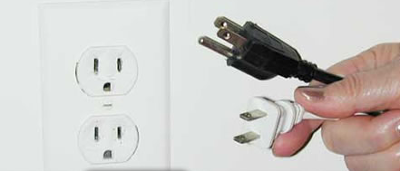Important Information for Visitors to the United States
Passport/Visa Requirements for Visitors
Entry into the United States of America requires that a visitor show a valid Passport and Visa to US Customs and Immigration authorities at the Port of Entry. You may obtain more information and apply for a visa at this U.S. State Department link.
If you require a letter of invitation to attend the workshop, please contact the local organizing committee chair as soon as possible. Contact information: Patricia.Doherty@bc.edu.
Electric Power in the USA
Electric power is standardized in all states across the USA. It is set at 110 Volts and 60 cycles. 220 Volt power is used in homes only for large appliances like stoves, water heaters and clothes dryers. It is not normally available for personal appliances.
Standard electric plugs, as illustrated below, have two flat blades. The plugs on some newer appliances have a third round grounding pin. Almost all homes and commercial buildings are equipped with electrical receptacles that can accommodate either type of plug.

If you bring any electrical appliance to the USA, you may need an adaptor to fit the US electrical receptacles. You may also need a converter to change the voltage from the local 110 volts to your 220 volts.
Most common appliances will function with either 50 or 60 cycle current. Electrical frequency can affect electric clocks, audio equipment and some other electronic gear. You should check your electrical equipment for compatibility with 60-cycle current before you bring it to the USA.
Currency Considerations
The Boston area uses the United States Dollar (US$) in all transactions. Foreign currencies may be exchanged for dollars at Logan Airport, some banks and major hotels in downtown Boston.
Major credit cards (VISA, Mastercard, American Express, etc.) are accepted nearly everywhere; charges will be recorded in US Dollars.
ATM machines generally use bank debit cards, and dispense only US$20 bills. Denominations above $20 may not be accepted by small merchants, and are subject to scanning for counterfeits, so plan accordingly.
Purchases in Massachusetts are subject to a sales tax of 6.25% on tangible property, which is added to the marked prices of items at checkout. Periodicals and most clothing purchases are exempt. Restaurant/cafe food is taxed, but groceries are not.
Public transportation (MBTA buses, trolleys, trains) accept cash or local “CharlieCards”. More MBTA information is here.
